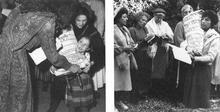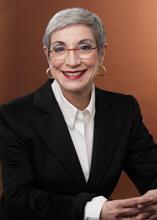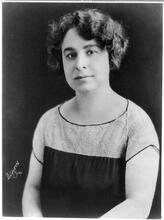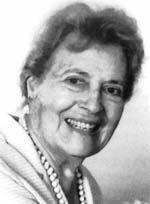Rose Chernin
Named in a landmark Supreme Court case that almost resulted in her deportation, Rose Chernin spoke out against injustice wherever she found it. During the Depression, Chernin organized protests against price gouging, supported rent strikes, and tenant negotiations. In 1932, she joined the Communist Party and briefly moved to Russia. In 1950, she founded the Committee for the Protection of the Foreign Born. The following year, she was arrested on charges of conspiracy to overthrow the government. In 1952, after her conviction, she was brought before the House Un-American Activities Committee but refused to name other communists. The government threatened to denaturalize her under the Smith Act, but in 1957 the Supreme Court ruled that the Smith Act required violent rebellion, not just membership in a political group, freeing Chernin to continue her activism.
Family and Early Life
Ambivalent about Judaism, passionately Marxist, charismatic, courageous, Rose Chernin devoted a great deal of her life to securing the rights of disenfranchised citizens: the unemployed of the Depression, farm workers without a union, Black home buyers thwarted by redlining, and other foreign-born leftists, like herself, who faced deportation in the 1950s.
Rochele Chernin was born in 1901 in Chasnik, Russia. She was renamed Rose when she and her three younger siblings, renamed Celia, Gertrude, and Milton, and their mother, Perle, landed at Ellis Island in 1913. They were met by Chernin’s father, Max, after five years of separation. The family moved to Waterbury, Connecticut, where Chernin’s father opened a dry-goods store. Her mother stayed home, suffering from her isolation in an unfamiliar world. Upon finishing grade school in Waterbury, Connecticut, fourteen-year-old Rose Chernin worked on a munitions assembly line. Chernin, a foreign-born, unskilled laborer, boldly requested admission to Crosby, the local preparatory school, over the local trade school. It was at Crosby that Chernin first met Paul Kusnitz, also from a Russian Jewish family. He introduced Chernin to socialist ideas through the newspaper the New York Call.
Chernin’s education was jeopardized when her father deserted the family and moved to Canonsville, Pennsylvania, where he opened another store. Resolutely, young Rose Chernin threatened him with jail if he did not send for his wife and their four younger children, who now included baby Lillian. Chernin herself wanted to stay in Waterbury to complete high school. In 1921, after her mother and siblings left for Pennsylvania, Chernin graduated and went to New York City. She entered Hunter College and found work in a perfume factory. All around her, Chernin saw New Yorkers organizing against unfair labor practices and dismal living conditions. Drawn to join them, she became active in a political group called the Russian Club, a commitment that precluded her continuing to study at Hunter. She left college, regretting that decision always.
Activism and Communist History
At age twenty-two, Rose Chernin heard from Paul Kusnitz, who had since received a degree in engineering from the Massachusetts Institute of Technology. On June 20, 1925, they married. Their happy marriage was based on the couple’s common socialist interests and mutual respect. They moved to the Bronx, and Paul began working on the subway. Shortly thereafter, her mother was placed, involuntarily, by her father, into a state psychiatric hospital in Binghamton, New York. Aghast at the conditions there, Rose Chernin successfully arranged for her mother’s release, the first of many such battles she would fight on behalf of those weakened by unjust treatment and unable to defend themselves.
In 1929, at the beginning of the Great Depression, Chernin and Kusnitz had their first child, Nina. As a young mother, Chernin organized pickets to protest price gouging in poor neighborhoods, led tenant negotiations, and supported rent strikes. She also helped form unemployed councils, petitioning congressional representatives to provide either more jobs or unemployment insurance. In 1932, Rose Chernin joined the Communist Party, campaigning for election as alderwoman in the Bronx. Then Kusnitz lost his job. The family moved to the Soviet Union, where Kusnitz worked on the Moscow subway, while Chernin worked in a publishing house.
On a visit to Los Angeles in 1934, Chernin saw fourteen communist activists like herself arrested and tried under the Criminal Syndicalist Laws, which outlawed organizing. Hearing the prisoners’ call for her help, Chernin decided to stay in California and form a defense committee. Within the year, the prisoners were released. By this time, Rose Chernin had decided that she could not give up her work in America. Kusnitz returned from Moscow, and once again the family lived together in the Bronx.
Their second daughter, Kim Chernin, was born in 1940. Soon Chernin was asked to become the organizational secretary for the Communist Party of the Bronx. But in 1944, tragedy struck when Nina died of Hodgkin’s disease. Rose Chernin retreated from political work, and the family moved to California, determined to leave the place associated with their profoundest sorrow.
Two years later, when African-American neighbors in Los Angeles had a cross burned on their property, Chernin began organizing to protect housing rights. Renewed in her work, Chernin spearheaded a campaign to support Henry Carlisle, a British-born movie writer targeted for deportation as a communist. Once again visible in the people’s struggle, Chernin became executive secretary of the Committee for the Protection of the Foreign Born, which she founded in 1950. Rose Chernin’s known success as an organizer led to her arrest in July 1951, when she was charged with forming a conspiracy to overthrow the government. With her bail set at $100,000, Chernin remained in jail until February 1952 when the trial began. Six months later, she was convicted, sentenced to five years in prison, jailed again, but released on bail five weeks later.
Trial
Not long after, Chernin was subpoenaed to appear before the House Un-American Activities Committee, but she refused to give the names of other communists. Another denaturalization proceeding followed, this time with the Immigration and Naturalization Service attempting to deport Chernin by arguing that when she applied for United States citizenship in 1928, she intended to join the Communist Party, thus violating the Smith Act of 1940. However, the judge refused to denaturalize her, reprimanding the government for having presented no evidence of her guilt. By 1957, the Supreme Court heard Yates v. United States, in which Rose Chernin was named. In a landmark decision, Chernin’s earlier conviction was overturned, ruling the Smith Act unconstitutional.
In 1967, Paul Kusnitz died in a car accident. In 1983, she saw the publication of In My Mother’s House, Kim Chernin’s deeply touching memoir that captures Rose Chernin’s Yiddish-inflected voice telling her sister’s heroic story. Appropriately, her last years were spent in a Los Angeles retirement home that resembled a collective. Among the residents were aged leftist friends, delighted to see their old comrade among them.
Rose Chernin died of Alzheimer’s disease on September 8, 1995, in Los Angeles, at almost ninety-four years of age.
Chernin, Kim. In My Mother’s House (1983).
Obituary. NYTimes, September 16, 1995, and San Francisco Chronicle, September 14, 1995.













